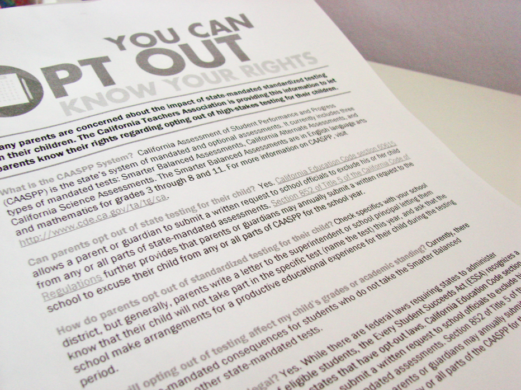
by Aozora Ito, Sports Editor
The time has come for 11th graders to take the Smarter Balanced Assessment starting next Tuesday, April 2nd. This is the fourth time Fountain Valley has administered this test and in the past years, a number of students have chosen to opt-out, which according to Every Student Succeeds Act (ESSA) parents have the right to do. But is that the best decision?
“Standardized school testing has been part of the educational landscape for at least the last 50 years. The test themselves have evolved throughout the decades, but testing is nothing new to the world of education,” said Assistant Principal Eva White.
Starting in spring 2015, the Smarter Balanced Assessment Consortium (SBAC) tests are computer-based assessments that measure a student’s knowledge in ELA/Literacy and mathematics, according to the California Department of Education (CDE). The CDE monitors test scores in order to improve education efforts statewide.
The SBAC is part of a new testing program called the California Assessment of Student Performance and Progress (CAASPP) which has replaced the old Standardized Testing and Reporting (STAR) system. With the STAR tests, students from grades two through eleven had to take an assessment every spring; with the new SBAC, testing is only required for grades three to eight and eleven.
Last spring, FVHS had the lowest participation rates in the Huntington Beach Union High School District with a participation rate of 93%, while other schools hit at least 98%. Unfortunately, most people aren’t aware that the state requirement to avoid possible repercussions including loss of funding is 95%.
“The rankings of both the school individually and the district as a whole hinge in part on student participation in SBAC,” said White. “Students who opt out hurt the campus as a whole by causing us to lose much needed funds.”
Thus, before 11th graders choose to opt-out, they should be aware of the benefits of taking the Smarter Balanced Assessment:
- A portion of the SBAC tests called the Early Assessment Program (EAP) determines the English/Mathematics placements for students going to California State Universities and community colleges in California.
- The SBAC tests are a part of the component of the seal of biliteracy in recognition of students who have studied/attained proficiency in two or more languages by high school graduation.
- Fountain Valley’s reputation is based in part on past Academic Performance Index (API) scores, which were based on students’ performances on the old STAR tests. Universities are aware of the schools with rigorous academic reputation, so it could be a factor in college admission.
Although it is aligned with Common Core standards, some believe it is not an accurate measure of student performance.
“Unfortunately, the questions had a lot of things about main ideas and supporting details, but there are a lot of other things we do in school that go way beyond,” said David Theriault, an English teacher at Fountain Valley High School.
Some of his concerns include the exclusions of close reading strategies and creative writing.
“The writings [on SBAC tests] are simplistic. I don’t think it’s really accurately showing whether a student is competent in all the common core standards,” said Theriault.





